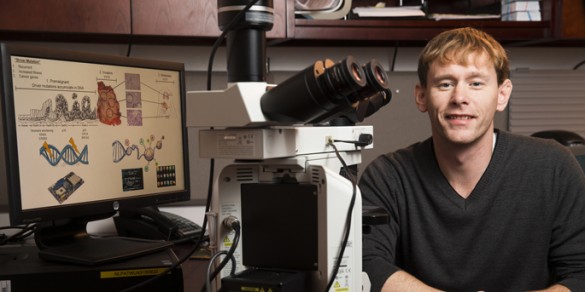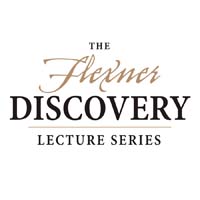
Beyond genetics — that’s the call Oliver McDonald, M.D., Ph.D., heard during the year between college and medical school he spent in a lab at St. Jude Children’s Research Hospital in Memphis.
“I did primarily genetics research, and I was seeing some results that we could not explain with genetics alone,” said McDonald, one of Vanderbilt University’s new cadre of basic biomedical scientists. “I decided there must be something beyond just genetics that controls gene expression and other biological phenomenon.”
Excited by the new field of epigenetics — how gene expression can be changed without altering the underlying DNA sequence — the West Tennessee native applied to and was admitted to the M.D./Ph.D. program at the University of Virginia School of Medicine, a leader in the field.
There McDonald discovered pathology and the dots began to connect for him — the laboratory bench work he loved, the study of epigenetics, and how both could be applied to understanding, stopping and perhaps one day even reversing cancerous growth.
McDonald’s tumor of choice for research arises in the pancreas and is one of the most fatal forms of cancer because it is difficult to diagnose early.
In 2012, as a postdoctoral fellow at Johns Hopkins University, he received a five-year, $600,000 “Pathway to Leadership Grant” from the Pancreatic Cancer Action Network and the American Association for Cancer Research (AACR) to support his work.
Last summer, McDonald accepted a position at Vanderbilt as assistant professor of Pathology, Microbiology and Immunology. “There seemed to be a very collaborative spirit here I didn’t see at other places,” he said. Through research and clinical practice, he also felt he could help patients.
Cancer is not one disease but many, depending on its underlying genetics. Now “we’re finding that even the same cancer in the same patient has different what we call ‘clones’ … areas that behave completely differently,” McDonald said.
Those behaviors are driven by in part by epigenetics — by proteins, signaling pathways and changes in metabolism that alter the structure of chromatin, the complex of nucleic acids and proteins that form the chromosomes in the nucleus.
“Cancer is a step-wise, evolutionary process with very well-defined stages,” McDonald said. “Early on, it seems, the genetic component of cancer … (is) very important, whereas later-stage lesions that actually kill the patient seem to be driven by epigenetics.”
McDonald and his colleagues have found that what are called “driver” mutations accumulate in early, precancerous lesions.
This is followed by “epigenetic reprogramming” that leads to the formation of tumors, invasive cancer and metastasis, its spread throughout the body.
It’s as if the normally healthy software that operates the body’s DNA “hardware” has been replaced by a mutated, malignant version, he said.
Within the next five years, McDonald hopes that some of the key elements of this “bad software” will be identified so “we can start to develop drugs against those factors, as well as develop diagnostic tests for patients based on epigenetics.”
“Unlike DNA mutations, epigenetics is a reversible process,” he said. “And so theoretically we can stop it or even reverse it at the later stages, and at the early stages we could possibly prevent it.”
In addition to the Pancreatic Cancer Action Network and AACR, McDonald’s research is supported by the Vanderbilt-Ingram Cancer Center, Vanderbilt Epithelial Biology Center, and the Department of Pathology, Microbiology and Immunology.















